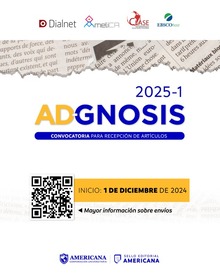Sustainable development with green economy in the Río Fucha basin
DOI:
https://doi.org/10.21803/adgnosis.10.10.470Keywords:
Environmental pollution, Environmental conservation, Hydrographic basin, WasteAbstract
The Fucha river through the city of Bogotá in the
department of Cundinamarca, which originates in the
El Delirio forest reserve in the Cruz Verde moor and
empties into the Bogotá river. In its first two kilometers
the channel does not It is contaminated, the rest has a
regular and poor state of conservation, since for decades
it has been used as a sewer receiving waste and sewage.
The challenge of the intervention for the recovery of
the Fucha river was to give it a reinterpretation of the
interaction between people and the environment as a
public space, integrating diverse informal recyclers into
formal solid waste management systems presenting
a series of challenges and opportunities when carried
out successfully, bearing in mind that their work can
improve performance of the system and environmental
sustainability while maintaining and even progressing
in the development of living conditions p For the people
around him and the informal recyclers, it also helps to
implement job opportunities for the recyclers, there are
different methods to implement different activities which
link the different elements of society.
Downloads
References
Ballesteros1, V. L., Urrego1, Y. C., Botero1, S. B., & Arango2, Y. L. (2005). Factores de riesgo biológicos en recicladores informales. Obtenido de http://bibliotecadigital.udea.edu.co/bitstream/10495/8013/1/BallesterosViviana_2008_FactoresRiesgoBiologicos.pdf
Barragán Morales, C., García-Guiliany, J., Meza-Rodríguez, V., Mercado Zapata, M., & Olarte Durán, L. (2019). Corporate Social Responsibility in print media in the Atlántico and Magdalena departments (Colombia). Económicas CUC, 41(1), 187.
Barrera Silva, N. (2020). La responsabilidad social con los stakeholders. Revista Colombiana De Ciencias Administrativas, 2(1), 40–61. https://doi.org/10.52948/rcca.v2i1.162
Duarte Suárez, A. D. (16 de junio de 2015). INDICADORES DE GOBERNANZA PARA LA GESTIÓN AMBIENTAL DEL RÍO FUCHA. Obtenido de http://hdl.handle.net/11349/3730
Duplat, K. C. (20 de 10 de 2015). Análisis de los instrumentos de gestión ambiental en el proceso de recuperación integral de la cuenca Río Fucha. Obtenido de http://repository.urosario.edu.co/handle/10336/11759
Gómez Bustamante, S. (7 de febrero de 2019). Apropiación del concepto de biodiversidad aplicado a los procesos educativos llevados a cabo en la cuenca del Río Fucha por el Jardín Botánico De Botánico De Bogotá José Celestino Mutis. Obtenido de http://hdl.handle.net/11349/14994
González Ramírez, L. F. (14 de julio de 2018). Análisis de alternativas para el aprovechamiento del material vegetal generado por el corte de césped en la limpieza de la Cuenca Fucha (Bogotá D.C.). Obtenido de http://hdl.handle.net/11349/13964
Infraestructura, N. C. (16 de diciembre de 1999). Gestión de cuencas y ríos vinculados con centros urbanos*. Obtenido de https://repositorio.cepal.org/bitstream/handle/11362/31384/S99120968_es.pdf?sequence=1&isAllowed=y
León Gómez, C. A., & Vega Carrillo, A. L. (2019). RAZONAMIENTO ESTADÍSTICO Y FORMACIÓN CIUDADANA A TRAVÉS DE PROBLEMÁTICAS AMBIENTALES. Obtenido de http://hdl.handle.net/20.500.12209/11411
Santos, C. M. (2009). El sector empresarial y la contaminación. Obtenido de https://www.redalyc.org/pdf/1210/121015710008.pdf
Simanca, J. A., Araujo, D. S., Porras, L. S., Viloria, M. R., Morales, C. B., & Guiliany, J. G. (2019). Efectos de los Stakeholders sobre el turismo sostenible en Barranquilla. Liderazgo Estratégico, 9(1), 82-96.
Sturzenegger, H. T. (2010). Dinámicas de Organización de los Recicladores Informales Tres casos de estudio en América Latina . Obtenido de https://publications.iadb.org/publications/spanish/document/Din%C3%A1micas-de-organizaci%C3%B3n-de-los-recicladores-informales-Tres-casos-de-estudio-en-Am%C3%A9rica-Latina.pdf
Tovar, E. R. (25 de mayo de 2011). Conciencia y cultura ambiental empresarial, un indicador de medida de la responsabilidad social empresarial. Caso río Fucha, Bogotá, d.c.1. Obtenido de https://s3.amazonaws.com/academia.edu.documents/47165553/522-1340-1-PB.pdf?response-content-disposition=inline%3B%20filename%3DConciencia_y_cultura_ambiental_empresari.pdf&X-Amz-Algorithm=AWS4-HMAC-SHA256&X-Amz-Credential=ASIATUSBJ6BAFJQ4UNGJ%2F20200330%2
Vidal, J. A. (marzo de 2010). Medición de la conciencia ambiental: Una. Obtenido de https://ddd.uab.cat/pub/athdig/15788946n17/15788946n17p33.pdf
Downloads
Published
Versions
- 2021-12-01 (2)
- 2021-12-01 (1)
Issue
Section
License
Copyright (c) 2021 ADGNOSIS

This work is licensed under a Creative Commons Attribution-NonCommercial-NoDerivatives 4.0 International License.






